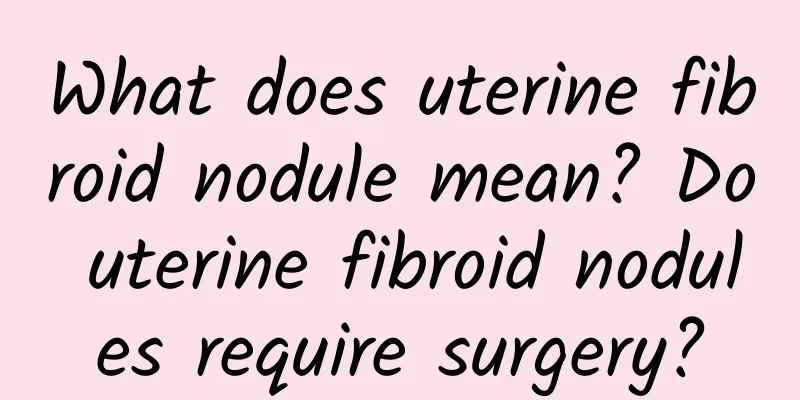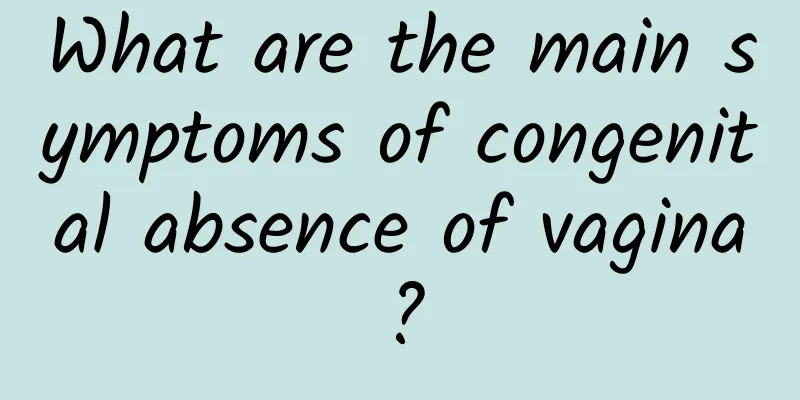What does uterine fibroid nodule mean? Do uterine fibroid nodules require surgery?

|
What does uterine fibroid nodule mean? Do uterine fibroid nodules require surgery? Uterine fibroids are a common gynecological disease that often occurs in women of childbearing age. Uterine fibroids are benign tumors formed by the proliferation of smooth muscle cells in the myometrium. They are usually nodular and can be located in the endometrium, myometrium, or subserosa. Uterine fibroid nodules are visible or palpable protrusions on the surface of uterine fibroids, and they often appear on the uterine wall. So, what do uterine fibroid nodules mean? 1. Definition of uterine fibroid nodules Uterine fibroid nodules are lesions of uterine fibroids that are located inside or outside the uterine wall. These nodules may be single or multiple. They are usually benign, but in some cases, they may be malignant. The size and number of uterine fibroid nodules vary from person to person. Some people have nodules that are only a few millimeters, while others may have nodules that grow to several centimeters. 2. Symptoms of uterine fibroid nodules Uterine fibroid nodules can cause a range of symptoms, including: 1. Abnormal menstruation: such as excessive menstrual flow, prolonged menstrual period, etc. 2. Abdominal pain or back pain: Uterine fibroid nodules may compress surrounding tissues and nerves, causing pain. 3. Frequent and urgent urination: If the uterine fibroid nodules press on the bladder, it may cause symptoms of frequent and urgent urination. 4. Defecation problems: If uterine fibroid nodules press on the rectum, it may cause difficulty in defecation or constipation. 5. Infertility: Uterine fibroid nodules may affect the implantation of fertilized eggs or embryo development, leading to infertility or recurrent miscarriage. 3. Treatment of uterine fibroid nodules 1. Observation and treatment: For uterine fibroid nodules with no symptoms or mild symptoms, observation and treatment can be selected. Regularly check the changes in the size of the nodules and treat as needed. 2. Drug treatment: Drug treatment includes hormone drugs and anticoagulants. Hormone drugs can relieve symptoms and reduce the size of nodules, while anticoagulants can reduce menorrhagia caused by uterine fibroid nodules. 3. Surgical treatment: Surgical treatment is one of the most common methods for treating uterine fibroid nodules. Surgery can be performed by removing the nodules, partial hysterectomy, or total hysterectomy. The choice of surgical method depends on the size, number, location of the nodules, as well as the patient's age and fertility needs. IV. Conclusion Uterine fibroid nodules refer to uterine fibroid lesions located inside or outside the uterine wall. It can cause a range of symptoms, including menstrual abnormalities, abdominal pain, frequent and urgent urination, bowel problems, and infertility. For nodules with no symptoms or mild symptoms, observation or drug treatment can be chosen. For patients with severe symptoms or large nodules, surgical treatment may be a better option. The final treatment method should be determined based on the patient's specific situation and needs. |
>>: When can I have sex after an abortion? When can I have sex after an abortion?
Recommend
Pay attention to health care during menstruation. What should not be done during menstruation?
Women have a few days of inconvenience every mont...
Can I take birth control pills more than a month after ectopic pregnancy surgery?
Dear female friends, the recovery period after ec...
How to treat Bartholinitis
The main cause of Bartholinitis comes from sexual...
What medicine can cure endometrial tuberculosis?
Nowadays, due to some unhealthy factors, female f...
What causes pelvic inflammatory disease? It is related to physiological reasons
The onset of pelvic inflammatory disease is relat...
When is the best time to drink coffee: waking up or in the afternoon? Nutritionist Lin Yuwei: Don’t drink coffee at the wrong time at 4 key moments
Coffee is known as "black gold". When y...
Menstruation delayed by one month
Menstruation delayed by one month A one-month del...
Say goodbye to edema! 4 ways to get rid of edema
Is the swelling only in the legs? Or the whole bo...
What are the reasons for irregular menstruation in women after childbirth?
Menstrual irregularities are mainly manifested as...
What is the reason for women's amenorrhea and abdominal pain
Amenorrhea accompanied by abdominal pain may be c...
Which women are prone to cervical hypertrophy?
Which women are prone to cervical hypertrophy? Wo...
Is it serious to have uterine fibroids? How big is a uterine fibroid considered serious?
Uterine fibroids are the most common benign tumor...
How long after a miscarriage can I drink tea? What are the dangers of drinking tea after a miscarriage?
How long after a miscarriage can you drink tea? M...
Are you sure about the clinical manifestations of cervicitis?
Do you know the clinical manifestations of cervic...
Abdominal pain, uterine fibroids, what to check for color Doppler ultrasound, uterine fibroids, can abdominal B-ultrasound be used to detect them?
Abdominal pain is a common phenomenon and may be ...









